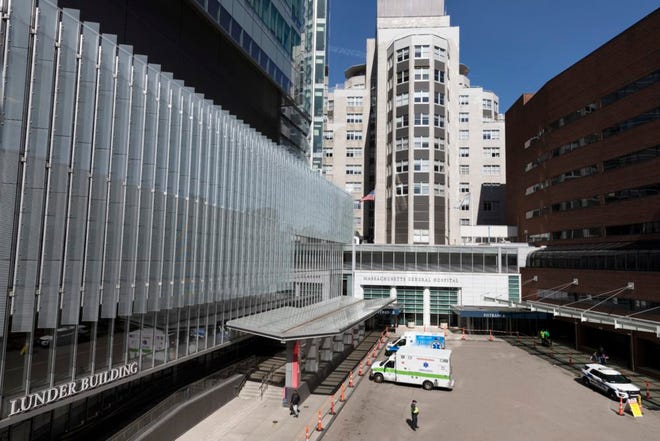
BOSTON – Nurses in Massachusetts have filed proposed ballot questions calling for redistributing earnings from well-off hospitals to those that may cut services, increasing financial transparency, and banning hospital CEOs from working with medical device or pharmaceutical companies.
Massachusetts Nurses Association Executive Director Julie Pinkham filed three initiative petitions with the Attorney General’s Office before Wednesday’s deadline. The petitions overlap in several areas, proposing varying combinations of the major policy shifts the union hopes to achieve.
In an interview Wednesday, Pinkham said she remains “definitely hopeful” that lawmakers will address the issues before November 2022 but she decided to submit the paperwork to keep the ballot question route available.
All of the proposed changes would apply to acute care hospitals in Massachusetts that receive state funding, both for-profit and not-for-profit, but not to other health care settings such as long-term care or rehabilitation.
Rich and poor
One of the three questions Pinkham submitted would target a hospital’s income that surpasses an annual operating margin of 8 percent. If a hospital brought in more money than that threshold in a given year, it would need to pay a civil penalty equal to the overage into a new “Medicaid Reimbursement Enhancement Fund.”
The state would then use the revenue in that fund to improve Medicaid reimbursements at eligible hospitals and to help prevent facilities from closing Department of Public Health-defined “essential services.”
“The balance sheets of most hospitals, especially those belonging to massive state and national corporations, quickly bounced back from the initial COVID-19 surge,” the nurses union said in a statement. “Left in the wake were patients struggling to get the quality of care they deserve, and nurses and health care professionals exhausted, traumatized and told to do more with less.”
In fiscal 2019, the statewide median acute hospital operating margin was 2.5 percent, according to data tracked and published by the state Center for Health Information and Analysis.

Several hospitals surpassed an operating margin of 8 percent that year, including Massachusetts General Hospital with a 9.6 percent margin, Center for Health Information and Analysis data shows.
Pinkham said behavioral health and pediatric or maternal health services have eroded over the past decade. That “death by a thousand cuts,” she said, forces residents in some areas of the state to deliver newborns in emergency rooms or wait several days for an in-patient behavioral health bed to become available.
“Maybe certain institutions don’t want to be anywhere other than Dover, Sherborn or Newton, but everybody needs health care and they deserve good health care, so we have to figure out a way to provide it,” Pinkham said. “If they don’t want to do it there, that’s fine, but if they’re going to make a lot of money doing it elsewhere, redistribute the wealth for the people that are willing to deliver good, quality services to these communities.”
‘Conflict issues’
A second question Pinkham filed would ban hospital CEOs from serving on the boards of or receiving compensation from a company that develops, manufactures or sells medical services or products such as devices or pharmaceutical drugs.
The Mass. Nurses Association pointed to a Boston Globe Spotlight report from April that found hospital leaders often held additional, sometimes well-paying roles at other companies.
“It definitely raises some conflict issues,” Pinkham said.
A spotlight on finances
The third and final ballot question would combine the redistribution and CEO sections of the other two with additional language requiring hospitals to report financial assets held outside the United States. None of the three proposals explicitly would require facilities to report executive pay.
The Massachusetts Health and Hospital Association, which represents hospitals and health care organizations, has often squared off with the nursing union on past proposals. Massachusetts Health and Hospital Association President Steve Walsh said on Wednesday that his group is still reviewing the latest proposal.
“In just the three years since MNA’s previous ballot question, our health care system has proven its worth as the best in the world,” Walsh said in a statement to the News Service. “Right now, we are focused on rebuilding the strength of our providers, which have been devastated in every imaginable way over the past 16 months. We are counting on all members of the health care community to rally around solutions that stabilize our health care institutions and their workers at this pivotal time.”
More:South Shore Hospital provides safe space for cancer patients seeking wigs
The union has pushed for the state to impose more robust disclosure requirements on hospitals in the past, including with a proposed ballot question in 2014 they ultimately dropped while maintaining pressure on lawmakers.
Some initiative petitions the nurses union filed have prompted Beacon Hill to act. In 2014, Gov. Deval Patrick signed a law setting nurse staffing levels inside intensive care units, prompting the union to drop one initiative petition on nurse-patient ratio changes and another on hospital financial transparency and CEO pay that had been headed for the ballot that November.
During the 2018 cycle, the union’s proposal to limit the number of patients assigned to nurses made it all the way to the ballot. Voters rejected that question, 70 percent to 30 percent, after one of the most expensive campaigns in state history.
You may also like
-
Rural hospital now thriving as others close
-
Baystate Health, Berkshire Health systems seek bigger ‘safety net’ as state readies 5-year Medicaid plan
-
Most Virginia hospitals and nursing homes aren’t mandating COVID-19 vaccines for their employees
-
St. Peter faces record patient surge amid fifth COVID wave
-
Hospitals hamstrung by ransomware are turning away patients
